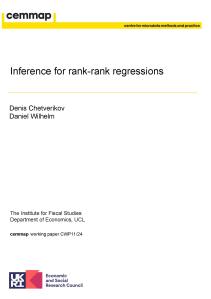Many empirical questions concern target parameters selected through optimization. For example, researchers may be interested in the effectiveness of the best policy found in a randomized trial, or the best-performing investment strategy based on historical data. Such settings give rise to a winner’s curse, where conventional estimates are biased and conventional confidence intervals are unreliable. This paper develops optimal confidence intervals and median-unbiased estimators that are valid conditional on the target selected and so overcome this winner’s curse. If one requires validity only on average over targets that might have been selected, we develop hybrid procedures that combine conditional and projection confidence intervals to offer further performance gains relative to existing alternatives.
Authors

Research Associate University College London and Brown University
Toru is a Research Associate of the IFS, a Professor of Economics at UCL and an Associate Professor in the Department of Economics at Brown University

Isaiah Andrews

Adam McCloskey
Working Paper details
- DOI
- 10.47004/wp.cem.2020.4320
- Publisher
- The IFS
Suggested citation
I, Andrews and T, Kitagawa and A, McCloskey. (2020). Inference on winners. London: The IFS. Available at: https://ifs.org.uk/publications/inference-winners-1 (accessed: 30 June 2024).
Related documents
More from IFS
Understand this issue

Gender norms, violence and adolescent girls’ trajectories: Evidence from India
24 October 2022

What are the challenges in getting debt on a falling path?
28 June 2024

Election Special: Your questions answered
27 June 2024
Policy analysis

IFS Deputy Director Carl Emmerson appointed to the UK Statistics Authority Methodological Assurance Review Panel
14 April 2023

ABC of SV: Limited Information Likelihood Inference in Stochastic Volatility Jump-Diffusion Models
We develop novel methods for estimation and filtering of continuous-time models with stochastic volatility and jumps using so-called Approximate Bayesian Compu- tation which build likelihoods based on limited information.
12 August 2014

Is there really an NHS productivity crisis?
17 November 2023
Academic research

Inference for rank-rank regressions
28 May 2024

Sample composition and representativeness on Understanding Society
2 February 2024

The impact of labour demand shocks when occupational labour supplies are heterogeneous
28 June 2024